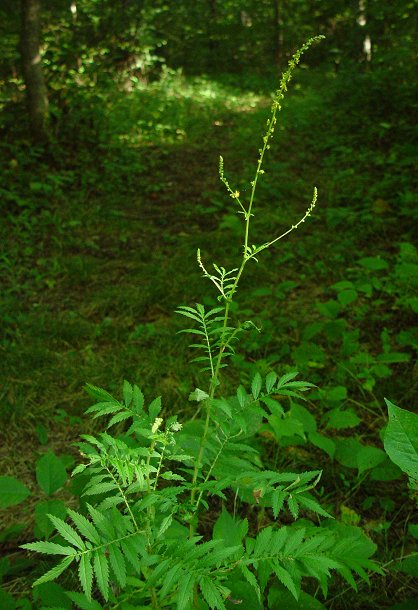Agrimonia parviflora Aiton
Swamp Agrimony

Native
CC = 5
CW = -3
MOC = 54
© DETenaglia
Agrimonia parviflora AitonSwamp Agrimony | |
 |
Native CC = 5 CW = -3 MOC = 54 |
© DETenaglia |
|
Family - Rosaceae Habit - Fibrous-rooted perennial forb. Stems - Ascending, to >1 m, densely pubescent and also glandular.
Leaves - Stipules leaflike. Leaf blades pinnately compound, to 30 cm long, with 11-23 primary leaflets along with numerous interspersed smaller leaflets. Leaflets elliptic, toothed, mostly glabrous adaxially, glandular and hairy abaxially.
Inflorescence - Terminal, spikelike racemes with flowers on very short stalks.
Flowers - With obconic hypanthium having numerous hooked bristles toward rim. Sepals 5, small, spreading at flowering but becoming erect at fruiting. Petals 5, bright yellow. Stamens 5-10.
Fruits - Hypanthium at fruiting 2-3 mm, fruits 4-5 mm including beak formed from erect sepals.
Flowering - August - September. Habitat - Moist to wet ground. Origin - Native to the U.S. Lookalikes - Other species of Agrimonia. Other info. - This striking species can be found throughout Missouri except for the the extreme northwest and southeast corners of the state. It also occurs throughout most of the eastern-central continental U.S. The plant is easy to ID in the field from its moist habitat and its pinnate leaves which have numerous (a dozen or more) primary leaflets with numerous interspersed secondary leaflets. The inflorescence of this species also tends to be more densely packed with flowers relative to other Missouri agrimonies. A. parviflora grows well from seed and could easily be cultivated in a wet area of the garden. Photographs taken in Brown Summit, NC., 7-28-02 (DETenaglia); also at Canaan Conservation Area, Gasconade County, MO, 8-11-2013, and Young Conservation Area, Jefferson County, MO, 8-17-2020 (SRTurner). |